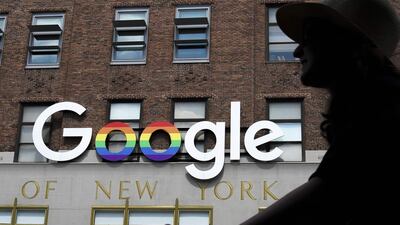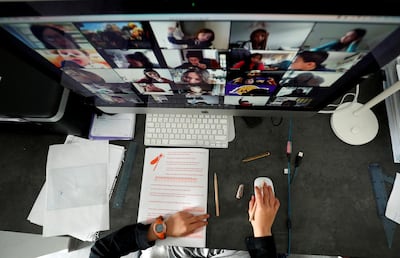Google banned its employees from using Zoom Video - a competitor to the company’s Hangouts Meet app - on company laptops and smartphones citing “security vulnerabilities”.
“We have long had a policy of not allowing employees to use unapproved apps for work that are outside of our corporate network,” the Alphabet-owned firm said in a statement on Wednesday.
The company emailed employees last week about not using Zoom on Google-provided machines. However, employees can continue to use the app through their personal devices.
Zoom has tried to address growing privacy concerns that emerged over the past two weeks as more people use the application in the wake of lockdowns and a surge in remote working. The company's chief executive Eric Yuan has apologised and promised to address security vulnerabilities.
“Clearly we have a lot of work to do to ensure the security of all these new consumer use cases,” Mr Yuan said through a live YouTube streaming on Wednesday. “But what I can promise you is that we take these issues very, very seriously. We are looking into each and every one of them. If we find an issue, we will acknowledge it and we will fix it.”
The company announced a 90-day feature freeze to dedicate all resources needed to “identify, address and fix security issues proactively”.
“We are conducting a comprehensive review with third-party experts and representative users to understand and ensure the security of all of our new consumer use cases,” Mr Yuan said.
Other organisations, including Elon Musk’s SpaceX, have banned the app over security concerns.
Last month, reports emerged that the Zoom app on Apple devices was directing users’ data to Facebook - including people who did not have accounts on the social networking site.
Zoom hired former Facebook and Yahoo chief security officer Alex Stamos as a consultant to address privacy concerns, strengthen the company’s battered image and win back consumer confidence.
“This opportunity to consult with Zoom was too interesting to pass up,” Mr Stamos, who led security at Facebook until 2018, said in his blog on Wednesday.
“He asked if I would be interested in helping Zoom build up its security, privacy and safety capabilities as an outside consultant, and I readily agreed.”
The number of users of the videoconferencing app increased dramatically over the past two months as hundreds of millions of people are confined to their homes and countries battle the coronavirus outbreak.
The daily number of meetings held on Zoom surged to 200 million from around 10 million in December.
The company's shares have more than doubled since January and its market capitalisation stands at $40.3 billion (Dh147.9bn).
Zoom is being used by various businesses, schools, universities, as well as for entertainment and fitness classes.
Profile
Company: Justmop.com
Date started: December 2015
Founders: Kerem Kuyucu and Cagatay Ozcan
Sector: Technology and home services
Based: Jumeirah Lake Towers, Dubai
Size: 55 employees and 100,000 cleaning requests a month
Funding: The company’s investors include Collective Spark, Faith Capital Holding, Oak Capital, VentureFriends, and 500 Startups.
The story in numbers
18
This is how many recognised sects Lebanon is home to, along with about four million citizens
450,000
More than this many Palestinian refugees are registered with UNRWA in Lebanon, with about 45 per cent of them living in the country’s 12 refugee camps
1.5 million
There are just under 1 million Syrian refugees registered with the UN, although the government puts the figure upwards of 1.5m
73
The percentage of stateless people in Lebanon, who are not of Palestinian origin, born to a Lebanese mother, according to a 2012-2013 study by human rights organisation Frontiers Ruwad Association
18,000
The number of marriages recorded between Lebanese women and foreigners between the years 1995 and 2008, according to a 2009 study backed by the UN Development Programme
77,400
The number of people believed to be affected by the current nationality law, according to the 2009 UN study
4,926
This is how many Lebanese-Palestinian households there were in Lebanon in 2016, according to a census by the Lebanese-Palestinian dialogue committee
From Europe to the Middle East, economic success brings wealth - and lifestyle diseases
A rise in obesity figures and the need for more public spending is a familiar trend in the developing world as western lifestyles are adopted.
One in five deaths around the world is now caused by bad diet, with obesity the fastest growing global risk. A high body mass index is also the top cause of metabolic diseases relating to death and disability in Kuwait, Qatar and Oman – and second on the list in Bahrain.
In Britain, heart disease, lung cancer and Alzheimer’s remain among the leading causes of death, and people there are spending more time suffering from health problems.
The UK is expected to spend $421.4 billion on healthcare by 2040, up from $239.3 billion in 2014.
And development assistance for health is talking about the financial aid given to governments to support social, environmental development of developing countries.
The%C2%A0specs%20
%3Cp%3E%3Cstrong%3EEngine%3A%3C%2Fstrong%3E%20Dual%20synchronous%20electric%20motors%20%20%0D%3Cbr%3E%3Cstrong%3EPower%3A%20%3C%2Fstrong%3E646hp%0D%3Cbr%3E%3Cstrong%3ETorque%3A%20%3C%2Fstrong%3E830Nm%0D%3Cbr%3E%3Cstrong%3ETransmission%3A%20%3C%2Fstrong%3ETwo-speed%20auto%20(rear%20axle)%3B%20single-speed%20auto%20(front)%20%0D%3Cbr%3E%3Cstrong%3EPrice%3A%20%3C%2Fstrong%3EFrom%20Dh552%2C311%3B%20Dh660%2C408%20(as%20tested)%0D%3Cbr%3E%3Cstrong%3EOn%20sale%3A%20%3C%2Fstrong%3Enow%3C%2Fp%3E%0A
Director: Laxman Utekar
Cast: Vicky Kaushal, Akshaye Khanna, Diana Penty, Vineet Kumar Singh, Rashmika Mandanna
Rating: 1/5
UAE%20Warriors%2033%20Results
%3Cp%3E%3Cstrong%3EFeatherweight%20title%3C%2Fstrong%3E%3Cbr%3EAli%20Al%20Qaisi%20by%20Jesse%20Arnett%20by%20submission%2C%20round%203%3Cbr%3E%3Cstrong%3EWelterweight%20title%3C%2Fstrong%3E%3Cbr%3EJosh%20Togo%20bt%20Tahir%20Abdullaev%20by%20unanimous%20decision%3Cbr%3E%3Cstrong%3EFlyweight%3C%2Fstrong%3E%3Cbr%3EIago%20Ribeiro%20bt%20Juan%20Puerta%20by%20unanimous%20decision%3Cbr%3E%3Cstrong%3EMiddleweight%3C%2Fstrong%3E%3Cbr%3EYerkin%20Darmen%20bt%20Tyler%20Ray%20by%20TKO%2C%20round%203%3Cbr%3E%3Cstrong%3EWelterweight%3C%2Fstrong%3E%3Cbr%3EAbdulla%20Al%20Bousheiri%20bt%20John%20Adajar%20by%20submission%2C%20round%201%3Cbr%3E%3Cstrong%3ECatchweight%20232lb%3C%2Fstrong%3E%3Cbr%3EAsylzhan%20Bakhytzhanuly%20bt%20Hasan%20Yousefi%20by%20submission%2C%20round%202%3Cbr%3E%3Cstrong%3ECatchweight%20176lb%3C%2Fstrong%3E%3Cbr%3EAlin%20Chirila%20bt%20Silas%20Robson%20by%20KO%2C%20round%201%3Cbr%3E%3Cstrong%3ECatchweight%20176lb%3C%2Fstrong%3E%3Cbr%3EArvin%20Chan%20bt%20Abdi%20Farah%20by%20TKO%2C%20round%201%3Cbr%3E%3Cstrong%3ELightweight%3C%2Fstrong%3E%3Cbr%3EOle-Jorgen%20Johnsen%20bt%20Nart%20Abida%20by%20TKO%2C%20round%201%3Cbr%3E%3Cstrong%3EBantamweight%3C%2Fstrong%3E%3Cbr%3EOtar%20Tanzilov%20bt%20Eduardo%20Dinis%20by%20TKO%2C%20round%203%3Cbr%3E%3Cstrong%3EStrawweight%3C%2Fstrong%3E%3Cbr%3EColine%20Biron%20bt%20Aysun%20Erge%20via%20submission%2C%20round%202%3Cbr%3E%3Cstrong%3EWelterweight%3C%2Fstrong%3E%3Cbr%3ESoslan%20Margiev%20bt%20Mathieu%20Rakotondrazanany%20by%20unanimous%20decision%3Cbr%3E%3Cstrong%3EBantamweight%3C%2Fstrong%3E%3Cbr%3EBakhromjon%20Ruziev%20bt%20Younes%20Chemali%20by%20majority%20decision%3C%2Fp%3E%0A
UAE v Gibraltar
What: International friendly
When: 7pm kick off
Where: Rugby Park, Dubai Sports City
Admission: Free
Online: The match will be broadcast live on Dubai Exiles’ Facebook page
UAE squad: Lucas Waddington (Dubai Exiles), Gio Fourie (Exiles), Craig Nutt (Abu Dhabi Harlequins), Phil Brady (Harlequins), Daniel Perry (Dubai Hurricanes), Esekaia Dranibota (Harlequins), Matt Mills (Exiles), Jaen Botes (Exiles), Kristian Stinson (Exiles), Murray Reason (Abu Dhabi Saracens), Dave Knight (Hurricanes), Ross Samson (Jebel Ali Dragons), DuRandt Gerber (Exiles), Saki Naisau (Dragons), Andrew Powell (Hurricanes), Emosi Vacanau (Harlequins), Niko Volavola (Dragons), Matt Richards (Dragons), Luke Stevenson (Harlequins), Josh Ives (Dubai Sports City Eagles), Sean Stevens (Saracens), Thinus Steyn (Exiles)
What is a Ponzi scheme?
A fraudulent investment operation where the scammer provides fake reports and generates returns for old investors through money paid by new investors, rather than through ligitimate business activities.
THE%20SPECS
%3Cp%3EBattery%3A%2060kW%20lithium-ion%20phosphate%3Cbr%3EPower%3A%20Up%20to%20201bhp%3Cbr%3E0%20to%20100kph%3A%207.3%20seconds%3Cbr%3ERange%3A%20418km%3Cbr%3EPrice%3A%20From%20Dh149%2C900%3Cbr%3EAvailable%3A%20Now%3C%2Fp%3E%0A
The specs
Engine: 3.0-litre six-cylinder turbo
Power: 398hp from 5,250rpm
Torque: 580Nm at 1,900-4,800rpm
Transmission: Eight-speed auto
Fuel economy, combined: 6.5L/100km
On sale: December
Price: From Dh330,000 (estimate)
MATCH RESULT
Al Jazira 3 Persepolis 2
Jazira: Mabkhout (52'), Romarinho (77'), Al Hammadi (90' 6)
Persepolis: Alipour (42'), Mensha (84')
The%20specs%3A%202024%20Mercedes%20E200
%3Cp%3E%3Cstrong%3EEngine%3A%20%3C%2Fstrong%3E2.0-litre%20four-cyl%20turbo%20%2B%20mild%20hybrid%0D%3Cbr%3E%3Cstrong%3EPower%3A%20%3C%2Fstrong%3E204hp%20at%205%2C800rpm%20%2B23hp%20hybrid%20boost%0D%3Cbr%3E%3Cstrong%3ETorque%3A%20%3C%2Fstrong%3E320Nm%20at%201%2C800rpm%20%2B205Nm%20hybrid%20boost%0D%3Cbr%3E%3Cstrong%3ETransmission%3A%20%3C%2Fstrong%3E9-speed%20auto%0D%3Cbr%3E%3Cstrong%3EFuel%20consumption%3A%20%3C%2Fstrong%3E7.3L%2F100km%0D%3Cbr%3E%3Cstrong%3EOn%20sale%3A%20%3C%2Fstrong%3ENovember%2FDecember%0D%3Cbr%3E%3Cstrong%3EPrice%3A%20%3C%2Fstrong%3EFrom%20Dh205%2C000%20(estimate)%3C%2Fp%3E%0A
The specs
- Engine: 3.9-litre twin-turbo V8
- Power: 640hp
- Torque: 760nm
- On sale: 2026
- Price: Not announced yet
Results
3pm: Handicap (PA) Dh40,000 (Dirt) 1,000m; Winner: Dhafra, Antonio Fresu (jockey), Eric Lemartinel (trainer)
3.30pm: Maiden (PA) Dh40,000 (D) 2,000m; Winner: Al Ajayib, Antonio Fresu, Eric Lemartinel
4pm: Handicap (PA) Dh40,000 (D) 1,700m; Winner: Ashtr, Abdul Aziz Al Balushi, Majed Al Jahouri
4.30pm: Handicap (TB) Dh40,000 (D) 1,700m; Winner: Falcon Claws, Szczepan Mazur, Doug Watson
5pm: Sheikh Dr Sultan bin Khalifa Al Nahyan Cup – Prestige Handicap (PA) Dh100,000 (D) 1,700m; Winner: Al Mufham SB, Al Moatasem Al Balushi, Badar Al Hajri
5.30pm: Sharjah Marathon – Handicap (PA) Dh70,000 (D) 2,700m; Winner: Asraa Min Al Talqa, Al Moatasem Al Balushi, Helal Al Alawi
Pros%20and%20cons%20of%20BNPL
%3Cp%3E%3Cstrong%3EPros%3C%2Fstrong%3E%0D%3C%2Fp%3E%0A%3Cul%3E%0A%3Cli%3EEasy%20to%20use%20and%20require%20less%20rigorous%20credit%20checks%20than%20traditional%20credit%20options%0D%3C%2Fli%3E%0A%3Cli%3EOffers%20the%20ability%20to%20spread%20the%20cost%20of%20purchases%20over%20time%2C%20often%20interest-free%0D%3C%2Fli%3E%0A%3Cli%3EConvenient%20and%20can%20be%20integrated%20directly%20into%20the%20checkout%20process%2C%20useful%20for%20online%20shopping%0D%3C%2Fli%3E%0A%3Cli%3EHelps%20facilitate%20cash%20flow%20planning%20when%20used%20wisely%0D%3C%2Fli%3E%0A%3C%2Ful%3E%0A%3Cp%3E%3Cstrong%3ECons%3C%2Fstrong%3E%3C%2Fp%3E%0A%3Cul%3E%0A%3Cli%3EThe%20ease%20of%20making%20purchases%20can%20lead%20to%20overspending%20and%20accumulation%20of%20debt%0D%3C%2Fli%3E%0A%3Cli%3EMissing%20payments%20can%20result%20in%20hefty%20fees%20and%2C%20in%20some%20cases%2C%20high%20interest%20rates%20after%20an%20initial%20interest-free%20period%0D%3C%2Fli%3E%0A%3Cli%3EFailure%20to%20make%20payments%20can%20impact%20credit%20score%20negatively%0D%3C%2Fli%3E%0A%3Cli%3ERefunds%20can%20be%20complicated%20and%20delayed%0D%3C%2Fli%3E%0A%3C%2Ful%3E%0A%3Cp%3E%3Cem%3ECourtesy%3A%20Carol%20Glynn%3C%2Fem%3E%3C%2Fp%3E%0A
UAE%20FIXTURES
%3Cp%3EWednesday%2019%20April%20%E2%80%93%20UAE%20v%20Kuwait%3Cbr%3EFriday%2021%20April%20%E2%80%93%20UAE%20v%20Hong%20Kong%3Cbr%3ESunday%2023%20April%20%E2%80%93%20UAE%20v%20Singapore%3Cbr%3EWednesday%2026%20April%20%E2%80%93%20UAE%20v%20Bahrain%3Cbr%3ESaturday%2029%20April%20%E2%80%93%20Semi-finals%3Cbr%3ESunday%2030%20April%20%E2%80%93%20Third%20position%20match%3Cbr%3EMonday%201%20May%20%E2%80%93%20Final%3C%2Fp%3E%0A
Ultra processed foods
- Carbonated drinks, sweet or savoury packaged snacks, confectionery, mass-produced packaged breads and buns
- margarines and spreads; cookies, biscuits, pastries, cakes, and cake mixes, breakfast cereals, cereal and energy bars;
- energy drinks, milk drinks, fruit yoghurts and fruit drinks, cocoa drinks, meat and chicken extracts and instant sauces
- infant formulas and follow-on milks, health and slimming products such as powdered or fortified meal and dish substitutes,
- many ready-to-heat products including pre-prepared pies and pasta and pizza dishes, poultry and fish nuggets and sticks, sausages, burgers, hot dogs, and other reconstituted meat products, powdered and packaged instant soups, noodles and desserts.
HOW TO WATCH
Facebook: TheNationalNews
Twitter: @thenationalnews
Instagram: @thenationalnews.com
TikTok: @thenationalnews
UAE currency: the story behind the money in your pockets
The specs: 2018 Ducati SuperSport S
Price, base / as tested: Dh74,900 / Dh85,900
Engine: 937cc
Transmission: Six-speed gearbox
Power: 110hp @ 9,000rpm
Torque: 93Nm @ 6,500rpm
Fuel economy, combined: 5.9L / 100km
Recipe
Garlicky shrimp in olive oil
Gambas Al Ajillo
Preparation time: 5 to 10 minutes
Cooking time: 5 minutes
Serves 4
Ingredients
180ml extra virgin olive oil; 4 to 5 large cloves of garlic, minced or pureed (or 3 to 4 garlic scapes, roughly chopped); 1 or 2 small hot red chillies, dried (or ¼ teaspoon dried red chilli flakes); 400g raw prawns, deveined, heads removed and tails left intact; a generous splash of sweet chilli vinegar; sea salt flakes for seasoning; a small handful of fresh flat-leaf parsley, roughly chopped
Method
▶ Heat the oil in a terracotta dish or frying pan. Once the oil is sizzling hot, add the garlic and chilli, stirring continuously for about 10 seconds until golden and aromatic.
▶ Add a splash of sweet chilli vinegar and as it vigorously simmers, releasing perfumed aromas, add the prawns and cook, stirring a few times.
▶ Once the prawns turn pink, after 1 or 2 minutes of cooking, remove from the heat and season with sea salt flakes.
▶ Once the prawns are cool enough to eat, scatter with parsley and serve with small forks or toothpicks as the perfect sharing starter. Finish off with crusty bread to soak up all that flavour-infused olive oil.
COMPANY%20PROFILE
%3Cp%3E%3Cstrong%3EName%3A%20%3C%2Fstrong%3EKinetic%207%3Cbr%3E%3Cstrong%3EStarted%3A%3C%2Fstrong%3E%202018%3Cbr%3E%3Cstrong%3EFounder%3A%3C%2Fstrong%3E%20Rick%20Parish%3Cbr%3E%3Cstrong%3EBased%3A%3C%2Fstrong%3E%20Abu%20Dhabi%2C%20UAE%3Cbr%3E%3Cstrong%3EIndustry%3A%3C%2Fstrong%3E%20Clean%20cooking%3Cbr%3E%3Cstrong%3EFunding%3A%3C%2Fstrong%3E%20%2410%20million%3Cbr%3E%3Cstrong%3EInvestors%3A%3C%2Fstrong%3E%20Self-funded%3C%2Fp%3E%0A
Pakistan v New Zealand Test series
Pakistan: Sarfraz (c), Hafeez, Imam, Azhar, Sohail, Shafiq, Azam, Saad, Yasir, Asif, Abbas, Hassan, Afridi, Ashraf, Hamza
New Zealand: Williamson (c), Blundell, Boult, De Grandhomme, Henry, Latham, Nicholls, Ajaz, Raval, Sodhi, Somerville, Southee, Taylor, Wagner
Umpires: Bruce Oxerford (AUS) and Ian Gould (ENG); TV umpire: Paul Reiffel (AUS); Match referee: David Boon (AUS)
Tickets and schedule: Entry is free for all spectators. Gates open at 9am. Play commences at 10am
The%20Killer
%3Cp%3E%3Cstrong%3EDirector%3A%C2%A0%3C%2Fstrong%3EDavid%20Fincher%3C%2Fp%3E%0A%3Cp%3E%3Cstrong%3EStars%3A%C2%A0%3C%2Fstrong%3EMichael%20Fassbender%2C%20Tilda%20Swinton%2C%20Charles%20Parnell%3C%2Fp%3E%0A%3Cp%3E%3Cstrong%3ERating%3A%3C%2Fstrong%3E%204%2F5%C2%A0%3C%2Fp%3E%0A
3%20Body%20Problem
%3Cp%3E%3Cstrong%3ECreators%3A%3C%2Fstrong%3E%20David%20Benioff%2C%20D%20B%20Weiss%2C%20Alexander%20Woo%3C%2Fp%3E%0A%3Cp%3E%3Cstrong%3EStarring%3A%20%3C%2Fstrong%3EBenedict%20Wong%2C%20Jess%20Hong%2C%20Jovan%20Adepo%2C%20Eiza%20Gonzalez%2C%20John%20Bradley%2C%20Alex%20Sharp%3C%2Fp%3E%0A%3Cp%3E%3Cstrong%3ERating%3A%3C%2Fstrong%3E%203%2F5%3C%2Fp%3E%0A




